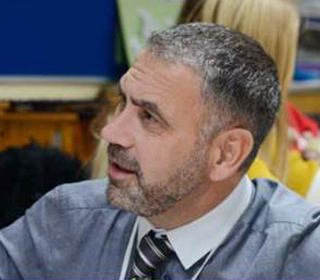PGCE Secondary Education with Religious Education (RE)
Become an RE teacher and earn Qualified Teacher Status (QTS). UK students studying on this course could be eligible for a £10,000 training bursary.

Entry requirements
A degree at 2:2 or above
GCSE English and Mathematics at grade 4 or grade C or above (or an equivalent qualification)
Experience of working with young people
We are committed to safeguarding and promoting the welfare of children and trainees. All trainees are expected to share this commitment and demonstrate consistently high standards of personal and professional conduct.
Any questions about postgraduate study at Marjon?
Contact Rachel Bailey-Lewis, our Student Recruitment Officer (Postgraduate).
Course Summary
Religious Education teachers empower young people and this PGCE RE aims to produce dynamic, confident, and innovative teachers who are committed to making Religion and Worldviews accessible for all. PGCE RE includes current debates and practices within Religion and Worldviews, as well as those issues relating to the promotion of the spiritual, moral, social and cultural development of all pupils; it develops a range of teaching styles appropriate to the delivery of Religion and Worldviews within the National Curriculum and GCSE/A Level specifications.
The course’s perspective on religious education distils the best practice of the recent past and gives a decidedly contemporary flavour with an eye to the future. Furthermore, our PGCE RE trainees take up ‘enhancements’ linked to other curriculum subjects, primary phase or special education needs and diversity.
The route to qualified teacher status will require you to work closely with all those involved in the training partnership – teachers, University tutors, school mentors, professional tutors in school and, last but not least, your fellow trainees. Ofsted 2014 commented that: “the collaborative nature of the partnership that promotes high-quality training across all settings". You are encouraged to take an active and collaborative role in your own learning and we all look forward to working with you on what we know will be a rewarding and enjoyable year working towards achieving your PGCE RE.
The curriculum is based around three themes and these are embedded in all MTEP modules across our provision and is carefully structured to provide you with the skills and subject knowledge required to teach effectively:
The themes are:
- The professional role of the developing teacher
- Development of teaching and learning
- Curriculum and specialisms
Our processes are aligned with the MTEP curriculum, the CCF, the ECF, the ITE Ofsted inspection framework and the Teachers’ Standards and explicitly considers how all components are sequenced incrementally to build your expertise and confidence.
Why this course at Marjon?
Top university in the UK for education-based courses in the Postgraduate Taught Experience Survey 2021
93.9 % of our graduates are in further study, sustained employment or both five years after graduating, compared to a sector average for England of 88.2% - we are 1st in the South West (LEO, 2019)
We have relationships with around 300 schools to give you a wide choice of learning experiences
Marjon education and teaching graduates are 3rd in all University providers for graduate earnings five years after leaving the university (Institute for Fiscal Studies, 2018)
Our graduates are more socially mobile than other providers across the South West with more trainees gaining ECT employment in more diverse areas (DFE Supply, Retention and Mobility data, 2018)
We recognise the value of excellent role models in initial teacher training and promote the involvement of outstanding teachers and specialist leaders in education in working with trainees
Modules for this course
1st Year
Professional practice in schools
Learning behaviours in context
Becoming a teacher: a reflective journey
Inclusion in the secondary classroom: maximising achievement
Understanding the learner: assessment and progress
This course is perfect if you’re curious about these questions:
How can I build strong relationships with pupils, colleagues and parents in school?
How can I promote a love of learning in my pupils and a passion for Religious Education?
How to I deal with challenging and controversial issues with my classes?
What can I do to develop my ability to become a leader in education?
How do good teachers keep on top of their workload?
How do I best prepare for applying for teaching jobs?
“ The overall quality of training continues to be a very positive one judging by the comments made by trainee teachers that I met... This goes for both university and school-based training sessions.... The humanities curriculum tutor has clearly provided thorough support to the trainee teachers throughout the training year and this was echoed strongly by the trainee teachers.”
What might you become?
RE teachers are in short supply and the regional demand will vary from year to year. Previous PGCE RE trainees are now in employment locally in Plymouth, Devon and Cornwall but also further afield e.g. East Midlands, London, Yorkshire, Birmingham and in international schools.
Marjon University will work with partnerships to ensure that you receive the very best in teacher training preparing you to teach in any type of school, church schools, academies, cooperative trusts, independent schools or free schools. The Guardian University Guide 2024 ranked us Top 5 in the UK for education.
Working with:

Dept for Education
Marjon is recognised as a teacher training provider by the Dept for Education.
School-based learning may be available
How you’ll be taught and assessed?
How will you be taught?
Collaborative learning, critical reflection and a strong culture of support underpin the RE PGCE. You will have a minimum of 120 days in school in 2 block placements and 12 weeks in University undertaking a range of activities, teaching includes lectures, seminars, workshops, conferences, tutorials, independent study or research and school based training.
How will you be assessed?
Assessments relate to your development of practice in school. All are coursework based, you will generate reflective journals, portfolios, essays and presentations.
Placement assessment is carried out by school mentors and university tutors against the three themes of the MTEP curriculum:
- The professional role of the developing teacher
- Development of teaching and learning
- Curriculum and specialisms

Giles is Programme lead for the Secondary PGCEs and Schools Direct.
Fees and funding
Fees UK students: £9,250
Fees for International students: £14,500
This fee covers your tuition and access to course-specific equipment and facilities, as well associated services including access to the library, study skills support, IT support, student support and wellbeing services and membership of the Student Union. There may be additional costs by course.
Funding available for this course
Students studying on this course are can apply for the government's initial teacher training bursary of £10,000. For more information on eligibility and how the scheme works, see this page.
Our Student Funding Advisors offer confidential and impartial advice about your funding options.
Learn more about fundingLecturers

Jonathan’s career as a history teacher has spanned over 25 years, working in secondary schools in Sussex, Suffolk and Cornwall. Previously, he has worked for Cornwall LEA as an Advanced Skills Teacher, supporting history departments, NQTs and recent entrants to the teaching profession across the county. He is a Teacher Fellow of the Historical Association.

Mark Andrew Dearden is a Senior Lecturer for the Marjon Teacher Education Partnership at Plymouth Marjon University.
His present role makes use of my key skills in contextual and educational studies, teaching and learning in the primary school, development of professional roles in students and teachers and subject specialisms of Art and Design and Religious Education.

Claire is Programme lead for the Secondary PGCEs and Schools Direct. Claire's specialist subject is English and before joining Marjon she worked in various secondary schools in Exeter as well for South West Teacher Training. Her research interests are reflective practice, teacher identity and retention.
More information
- See how to get into teaching for the inside track on teacher training from our lecturers, trainees and teaching graduates.




